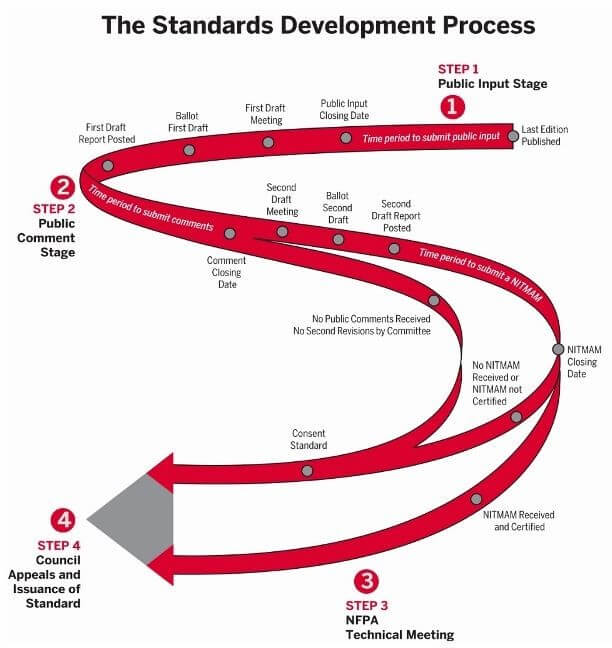PROPOSED CHANGES TO NEC 2020

Impacts on Reconditioning Companies
Reconditioning companies across the U.S. are facing a potential threat that will negatively affect any business with a critical electrical infrastructure.
The National Fire Protection Association (NFPA) recently presented to the American National Standards Institute (ANSI) the updated NFPA-2020 National Electric Code (NEC), which they had recently revised through the required rounds of its standards development process.
Suggested changes must be proposed and approved during the public input stage and then published for review and comment, according to the American National Standard (ANS) process. However, there are 17 changes to the reconditioned equipment section that were proposed in the standard after the public comment stage.
The Standards Development Process
The Regulations Governing the Development of NFPA Standards establishes the procedure for the NFPA standards development. All NFPA standards are revised and updated every three to five years in cycles that begin twice each year, according to the NFPA standards development process.
Each revision cycle proceeds according to a published schedule which includes final dates for each stage in the standards development process, according to NFPA. The four fundamental steps in this process are:
- Public Input
2. Public Comment
3. NFPA Technical Meeting (Tech Session)
4. Standards Council Action (Appeals and Issuance of Standard)
Reconditioned Defined
The National Electric Manufacturers Association (NEMA) Policy on Reconditioned Electrical Equipment states that reconditioned equipment is defined as electromechanical systems, equipment, apparatus or components that are restored to operating conditions.
This process differs from normal servicing of equipment that remains within a facility, or replacement of listed equipment on a one-to-one basis, according to the NEC.
However, the term reconditioned is incorrectly referred to as rebuilt, refurbished or remanufactured in the NEC 2020 revisions.
Proposed Changes
The Remanufacturing Industries Council (RIC) wrote a letter to the NFPA to request that they would pass on the 17 proposed changes until the next code making cycle because of their potential harm to the industry. Postponing the proposed changes until the next coding cycle would allow the industry at large to comment.
Christel Hunter states several of the proposed changes in her presentation at the 2019 PEARL Conference:
- Reconditioned equipment will be identified as “reconditioned” and the original listing mark will be removed unless it is reconditioned by the owner or operator as part of regular maintenance
- The following equipment cannot be reconditioned: equipment that provides ground-fault circuit interrupter protection for personnel, arc-fault circuit interrupter for protection, ground-fault protection for equipment, and eleven other types of equipment
- The reconditioning process shall use design qualified parts verified under applicable standards and be performed in accordance with any instructions provided by the manufacturer
- Panelboards shall not be permitted to be reconditioned
- Reconditioned switchgear shall be listed, or field labeled as reconditioned, and previously applied listing marks, if any, within the portions reconditioned shall be removed
Rippling Effect
According to the most recent International Trade Commission survey, the size of the remanufacturing sector of our economy represents at least $43 billion annually, as well as providing hundreds of thousands of jobs in our economy.
The proposed changes to remanufactured equipment, although well intentioned, will not only hurt reconditioning companies, but also the U.S. manufacturing industry for multiple reasons.
For example, the industry will experience a restricted supply of readily available and safe electrical distribution equipment and an increase of business interruption claims. There will also be an increase in the cost of acquiring, engineering, and scheduling extended shutdowns to replace entire substations.
Take Action
The deadline to file a notice of intent to make a motion to reject these proposed changes was April 26, 2019. Voting members of NFPA were also able to attend the Technical Association meeting in San Antonio, Texas, on June 20 to voice their concerns and vote for certified amending motions.
It is still possible to file an appeal with the NFPA Standards Council by July 10, 2019. The Standards Council will be meeting from August 5 to August 7 in Quincy, Massachusetts, this year to provide final approval on the proposed changes to the NEC standard.
Visit the NFPA website to learn more about the NFPA Standards Council and their meetings.
Republished with permission of National Field Services. Originally published on June 27, 2019.
